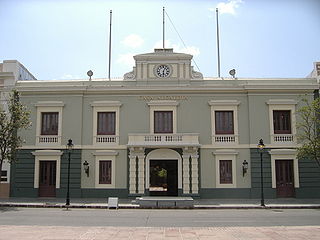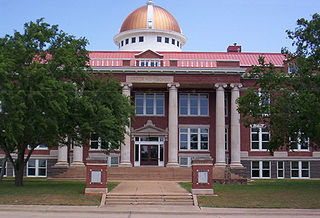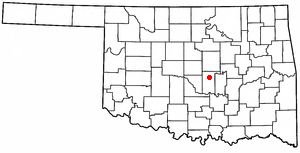
A municipality is usually a single administrative division having corporate status and powers of self-government or jurisdiction as granted by national and regional laws to which it is subordinate. It is to be distinguished (usually) from the county, which may encompass rural territory or numerous small communities such as towns, villages and hamlets.
In many countries, a mayor is the highest-ranking official in a municipal government such as that of a city or a town.

The city of Lawton is the county seat of Comanche County, in the State of Oklahoma. Located in southwestern Oklahoma, about 87 mi (140 km) southwest of Oklahoma City, it is the principal city of the Lawton, Oklahoma Metropolitan Statistical Area. According to the 2010 census, Lawton's population was 96,867, making it the fifth-largest city in the state.

Shawnee is a city in Pottawatomie County, Oklahoma, United States. The population was 31,543 in 2014, a 4.9 percent increase from 28,692 at the 2000 census. The city is part of the Oklahoma City-Shawnee Combined Statistical Area; it is also the county seat of Pottawatomie County and the principal city of the Shawnee Micropolitan Statistical Area.

Purcell is a city in and the county seat of McClain County, Oklahoma, United States. As of the 2010 census, the city population was 5,884.

Broken Arrow is a city located in the northeastern part of the U.S. state of Oklahoma, primarily in Tulsa County but also with a section of the city in western Wagoner County. It is the largest suburb of Tulsa. According to the 2010 census, Broken Arrow has a population of 98,850 residents and is the fourth-largest city in the state. However, a July 2017, estimate reports that the population of the city is just under 112,000, making it the 280th-largest city in the United States. The city is part of the Tulsa Metropolitan Area, which has a population of 961,561 residents.
A civil township is a widely used unit of local government in the United States that is subordinate to a county. The term town is used in New England, New York, and Wisconsin to refer to the equivalent of the civil township in these states. Specific responsibilities and the degree of autonomy vary based on each state. Civil townships are distinct from survey townships, but in states that have both, the boundaries often coincide and may completely geographically subdivide a county. The U.S. Census Bureau classifies civil townships as minor civil divisions. Currently, there are 20 states with civil townships.
A township, in the context of New Jersey local government, refers to one of five types and one of eleven forms of municipal government. As a political entity, a township in New Jersey is a full-fledged municipality, on par with any town, city, borough, or village. They collect property taxes and provide services such as maintaining roads, garbage collection, water, sewer, schools, police and fire protection. The Township form of local government is used by 27% of New Jersey municipalities; however, slightly over 50% of the state's population resides within them.
An incorporated town is a town that is a municipal corporation.

The National League of Cities (NLC) is an advocacy organization in the United States that represents the country's 19,000 cities, towns, and villages along with 49 state municipal leagues. Created in 1924, it has evolved into a leading membership organization providing education, research, support, and advocacy to city leaders across America. Based in Washington, D.C., it is considered part of the 'Big Seven', a group of organizations that represent local and state government in the United States. The NLC provides training to municipal officials, holds conferences, lobbies and provides assistance to cities in educational issues.

The government of the U.S. State of Oklahoma, established by the Oklahoma Constitution, is a republican democracy modeled after the federal government of the United States. The state government has three branches: the executive, legislative, and judicial. Through a system of separation of powers or "checks and balances," each of these branches has some authority to act on its own, some authority to regulate the other two branches, and has some of its own authority, in turn, regulated by the other branches.

M. Susan Savage is an American Democratic politician from Oklahoma. She was the 36th Mayor of Tulsa from 1992 to 2002, the first woman to hold that office. From 2003 to 2011, she was the 29th Secretary of State of Oklahoma.
In the United States, the meaning of "village" varies by geographic area and legal jurisdiction. In many areas, "village" is a term, sometimes informal, for a type of administrative division at the local government level. Since the Tenth Amendment to the United States Constitution prohibits the federal government from legislating on local government, the states are free to have political subdivisions called "villages" or not to and to define the word in many ways. Typically, a village is a type of municipality, although it can also be a special district or an unincorporated area. It may or may not be recognized for governmental purposes.

The Oklahoma Firefighters Pension and Retirement System (OFPRS) is an agency of the government of Oklahoma that manages the public pension system for firefighters in Oklahoma. The System provides pension benefits such as normal retirement, disability retirement, surviving spouse benefits and a death benefit.

CAA Club Group, formerly CAA South Central Ontario, is an affiliated club of the Canadian Automobile Association (CAA) in the Canadian provinces and territories of Manitoba, Nunavut, and parts of Ontario. It is a not for profit organization with its head offices located in Thornhill, Ontario and Winnipeg, Manitoba. CAA Club Group primarily provides roadside assistance, auto, property & travel insurance services, as well as leisure travel services to its members.








